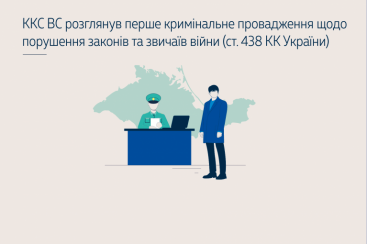Contact center of the Ukrainian Judiciary 044 207-35-46

The Criminal Cassation Court of the Supreme Court considered a cassation appeal of a defence lawyer of a person convicted of a crime under part 1 of Art. 438 of the Criminal Code of Ukraine "Violation of the laws and customs of war" under the special procedure of criminal proceedings "in absentia".
The courts of previous instances found that a citizen of Ukraine, who in 2019 took the position of "senior assistant military commissar", and later - "military commissar of the city of Feodosiia and Kirovskyi district of the Republic of Crimea", aware of the existence of an international armed conflict and the temporary occupation of the Autonomous Republic of Crimea and the city of Sevastopol, carried out forced conscription for military service in the Armed Forces of the russian federation of the civilian population of Ukraine residing in the temporarily occupied territory of Ukraine - the Autonomous Republic of Crimea and the city of Sevastopol.
The verdict of the court of first instance, upheld by the court of appeal, found the person guilty of committing a criminal offence under part 1 of Art. 438 of the Criminal Code of Ukraine and sentenced him to 8 years in prison.
In the cassation appeal, the defence pointed out that the court had failed to prove the convict's personal involvement in forcing civilians to serve in the armed forces of the russian federation. Coercion as a qualifying element of a criminal offence had to be proved in criminal proceedings by factual evidence - the physical or psychological influence of the convicted person on persons by using physical force, threats, physical violence, causing moral or material damage.
In its turn, the prosecution noted that the occupying state violated the norms of international humanitarian law by recruiting civilians living in the occupied territory to serve in the armed forces of the russian federation. In particular, the occupation authorities appointed civil servants, legislated on the issue of conscription, and regulated the structure of the military commissariats of the russian federation in the occupied territories. In addition, military commissars were actively involved in forced conscription. In this respect, representatives of the authorities (including the convicted person) are personally responsible for their actions.
After considering the cassation appeal of the convict's defence lawyer, the Criminal Cassation Court of the Supreme Court dismissed it and upheld the decisions of the courts of previous instances.
The full text of the Resolution of the Criminal Cassation Court of the Supreme Court of 28 February 2024 in case no. 753/14148/21 (proceedings no. 51-6134km23) will be available in the Unified State Register of Court Decisions (USRCD) at https://reyestr.court.gov.ua/.